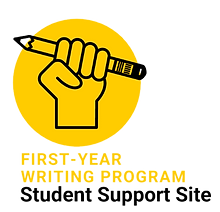COLLEGE COMPOSITION I
COURSE DESCRIPTION

What is College Composition II about? How is it different than Comp I?
First-Year Writing at Rowan focuses on rhetorically purposeful writing; having a writing purpose means to have an aim or goal, generally to produce an effect on an audience (e.g., to inform, to entertain, to persuade, etc.). One rhetorical purpose is to argue, which means to try to convince an audience that a certain point of view is true/better than others. In this sense, you have already written an argument in I/CCI or other courses, but haven’t necessarily studied arguments formally.
CCII’s Defining Features:
-
Formal argumentation
-
Research & Information literacy
-
Self-direction
Formal argumentation means to study strategies of argumentation, particularly logical reasoning, the use of evidence, and the appropriate use of emotional appeal. More specifically, we will study the strategies associated with specific types of arguments:
-
Definition (including resemblance)
-
Causal
-
Evaluation
-
Ethical
-
Proposal
-
Rebuttal
Why do we do this? Well, the problems we study both in public life and in academic settings raise questions that we can categorize in such a way that they call for a specific type of argument to resolve them. See this list of questions that the issue of sexting raises and how they can be categorized differently:
Definition: Is sexting “child pornography”? Is this behavior “abnormal”?
Causes and Effects: Why do teens do this? How does sexting affect teens? How do specific legal repercussions affect teens?
Ethics: Is it wrong to punish a teen for sexual exploration? Should consensual self-sexting be treated differently than sexting photos of others without their consent?
Evaluation: What are fair or effective legal repercussions, depending on the circumstances?
Proposals: Do we need to change child pornography laws to account for sexting?
In CCII, you will choose an issue to research and explore, and you will write multiple argumentative essays or other writing projects that respond to different categorical questions related to your issue. The issue you choose should be one that both public figures/popular writers and scholars/academic writers are participating in. In other words, you will choose a current, controversial issue that people are talking about right now and join public and/or academic conversations about it, basing your own arguments on your research.
Information Literacy:
-
Ability to find and evaluate sources of information
-
Ability to select information appropriate to the rhetorical situation
-
Ability to integrate information effectively into one’s writing
While you have had previous experience summarizing and working with sources, and possibly evaluating them, in I/CCI, CCII In CCII, there will be a greater emphasis on finding and working with your own sources. In fact, it is likely that most or all of the sources you use in your essays will be unique to you because everyone is choosing their own issue to research. As part of this process, you will build an annotate bibliography as you do your research.
Self-direction: As you can see, another feature of CCII is that you are given both more freedom in terms of what you research and write about, but this also involves you taking on more responsibility for making decisions and choosing the resources you want to use to be successful. For example, there will be fewer required drafts due, but you might choose to submit additional drafts. You are also encouraged to seek the support of the Writing Center, which offers both in-person and online tutoring.